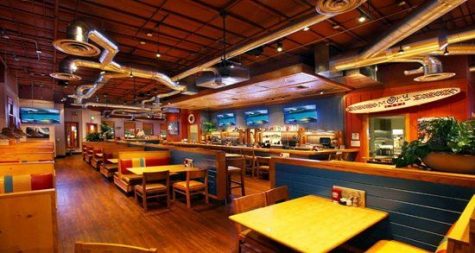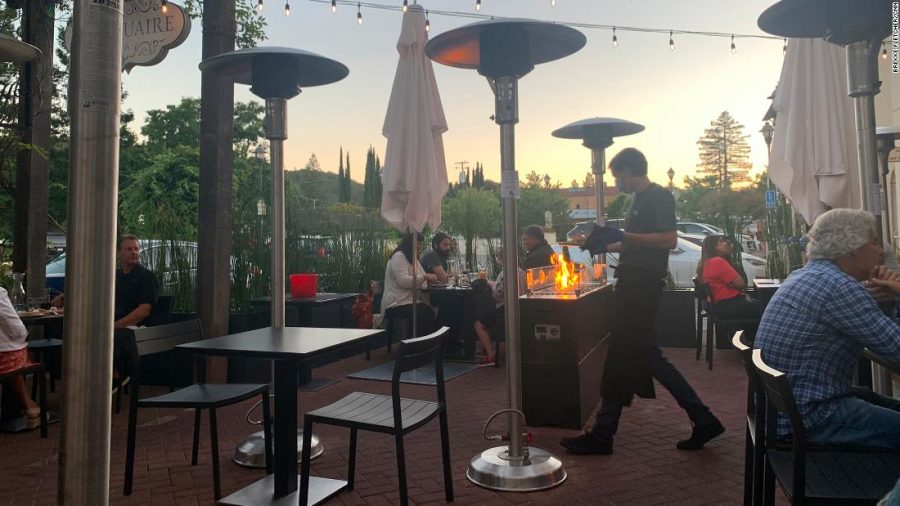A Shift of an Essential Worker
12 P.M. on a Saturday
As you drive down the street, you notice how many cars always seem to be on the road. Where are all these people going that’s important enough to break quarantine? They can’t all be going to work, like you, can they? There are not that many essential workers, not enough to create traffic for the entire twenty-minute car ride. You remember how it used to be different; your memories of eerily open streets and empty parking lots from last spring come to mind as you sit, gripping the steering wheel.
12:28 P.M.
As you pull into the parking lot, you drive past the rows of tables underneath the cabana that you helped set up just weeks ago. It shouldn’t technically be there since California is past “purple tier”, but no one has forced your team to take it do wn and the corporate offices want to keep it up. Later in the day, families will be eating there, and there’s not much that you can do about it. You park your car and make sure to grab everything that you need for your shift: a sharpie, a couple pens, your apron, and a mask. You walk into the side door of your restaurant and stroll past at least a dozen booths that used to be for customers, but now just function to collect dust. You wave to your manager as you clock in on the computer terminal that you’ll use to take orders for the next couple of hours.
wn and the corporate offices want to keep it up. Later in the day, families will be eating there, and there’s not much that you can do about it. You park your car and make sure to grab everything that you need for your shift: a sharpie, a couple pens, your apron, and a mask. You walk into the side door of your restaurant and stroll past at least a dozen booths that used to be for customers, but now just function to collect dust. You wave to your manager as you clock in on the computer terminal that you’ll use to take orders for the next couple of hours.
12:45 P.M.
The first fifteen minutes of your shift pass almost unconsciously. You wash your hands, put on a fresh pair of gloves, and use the no-touch thermometer to check your temperature as you’ve grown so accustomed to doing in these past weeks. It’s always in the early moments of your shift that you realize how eerily empty the restaurant is. The only people in the entire building are yourself, your manager, a cook, and your fellow service partner. Service partners’ only job is to handle takeout orders and DoorDash deliveries, which while simple, is now crucial to the operation of the restaurant. You lean back against the take-out counter and hum along to The Jackson 5 song playing on the speaker above the “burger window”. Now is the time for you to play the waiting game.
12:53 P.M.
A sound that you know all too well rings out from the tablet, rousing you from your trance. It’s the sound that indicates a DoorDash order has been sent to your location. You snap to attention and log into the terminal to start inputting the order. You know that this is going to be the first order of many and you prepare yourself accordingly; you set aside a bag for the order and begin to talk to the cook about the modifications on the burger.
1:14 P.M.
Business has started to significantly pick up as the first driver for DoorDash walks through the door. These drivers, or “Dashers”, are one of two types of customers that you get to see in person nowadays. The man approaches the counter, staring directly at his phone and refusing to make eye contact. You put on a smile, even though he can’t see it through your mask, and politely introduce yourself. He cuts you off mid-sentence and simply says “DoorDash for Rachel”, never looking up from his phone. You hand him the takeout bag and he’s on his way out the door just as another order rings on the tablet.
2:32 P.M.
Another hour passes just with DoorDash order after DoorDash order when the other type of customer walks through the door: a family who apparently hasn’t heard about the global pandemic. A man, woman, and their two children walk through the entrance, none of which are wearing masks. You politely ask them to put on a mask and offer to provide them with masks if they need; they roll their eyes and mutter something about not being able to breathe as they fish masks out of their pockets and put them on. You begin taking their order for takeout and they move closer to you every time they add another item to purchase, practically leaning over the counter by the end. You charge them for their order and tell them it’ll be ready in about fifteen minutes. As the father signs the receipt, you notice, somewhat spitefully, that they don’t leave a tip.
2:53 P.M.
At this point, three or four more families have come in to order their food for takeout. Even though they ordered their food to go, they’re currently sitting underneath the outdoor dining cabana. This is a legally grey area: while outdoor dining is banned in the county, you didn’t serve them at their tables, so the tables are treated as public benches where people are free to sit as they please. You don’t necessarily agree with it, but there’s not much that you or your managers can do about it since it’s a corporate decision. The DoorDash orders have been piling up, so it’s beginning to look like crunch time for you and your coworkers. You speed-walk from counter to counter, packaging different boxes of french fries, burgers, salads, and chicken tenders. You bag the orders and hand them off to the group of dashers forming by the counter. This is the process that will get you through the rush.
3:45 P.M.
By now, the number of orders has subsided and you are left with a counter full of completed receipts and a dirty outdoor dining area. You grab a broom, dustpan, towel, roll of trash bags, and bottle of sanitising spray, beginning your closing work.
4:03 P.M.
After you finish your closing work, you simply wait by the counter for the next shift leader to come in. The other service partner left a couple minutes ago, leaving just the cook, your manager, and yourself. With nothing else to do, you stand by the phone and talk with them about how online school has been like in these past couple months.
5:02 P.M.
As the next shift leader walks through the door, your manager tells you that you can finally clock out. The shift couldn’t have ended any later. You’re grateful to have the job, of course, but sometimes the shifts can just leave you drained. The emptiness of the last hour of your shift never fails to somehow take more out of you than the busier parts of the day. You count out your tips from the register and clock out on the terminal. You walk out the door and call your goodbyes behind you, walking into the parking lot.
5:34 P.M.
On the drive home, you notice how the sun has begun to set already, even though you feel like the day just started. But you don’t necessarily want to think about that somewhat startling fact, because you just got home and that means it’s time to finally unwind. You throw yourself onto your bed and take a deep breath, trying to block the smell of french fries out of your mind. Just as you start to feel relaxed, a text from your general manager brings you back to reality. Orange County has re-entered the purple tier which means that businesses, including restaurants, have partially reopened. Because of this, your manager needs you to work every day of the next week while she “un-furloughs” your temporarily laid-off coworkers. You text her back an affirmative reply and collapse into your bed, thinking about the chock-filled week ahead.

